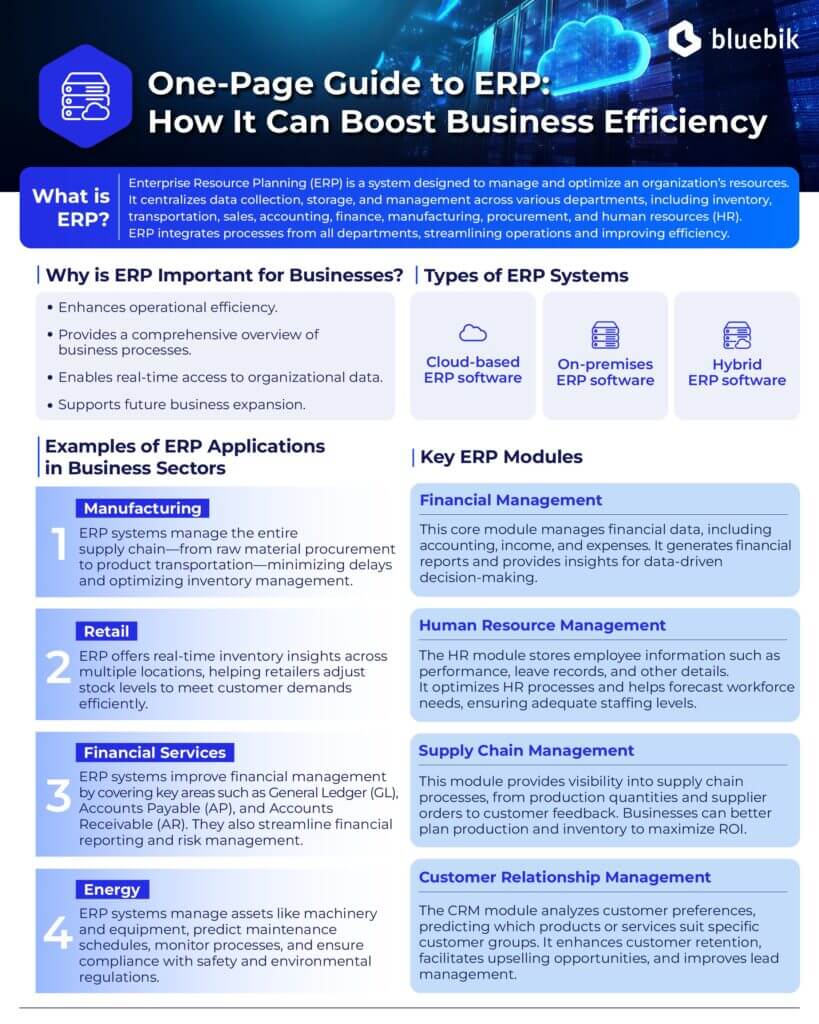In today’s increasingly complex business world, operations require speed and accuracy to maintain and enhance competitiveness. Efficient systems and solutions are crucial for managing various processes, making Enterprise Resource Planning (ERP) systems a significant component in organizational management.
This article aims to explore the potential of ERP systems, covering their definitions, importance, examples of usage, and guidance for organizations considering ERP implementation.

What is ERP?
Enterprise Resource Planning (ERP) is a management system that organizes, collects, stores, and centralizes data from various departments, such as inventory, logistics, sales, accounting, finance, production, procurement, and human resources. By linking these processes, ERP improves operational efficiency and fosters seamless collaboration across an organization.
Why is ERP Essential for Businesses?
- Improved Operational Efficiency: ERP automates parts of processes, reducing time and errors.
- Enhanced Visibility: ERP offers a comprehensive view of all workflows, facilitating smoother inter-department communication.
- Real-time Data Access: Access data from anywhere, improving process flexibility and effectiveness.
- Scalability for Growth: ERP systems expand to support growing business needs and adapt to organizational changes.
Types of ERP
- Cloud-based ERP: Accessible anytime and anywhere via the internet or mobile applications.
- On-premises ERP: Installed on local servers, offering higher security but limited remote access.
- Hybrid ERP: Combines online access and local server usage for flexibility.
Key ERP Modules
- Financial Management: Manages financial data, generating reports for strategic decisions.
- Human Resource Management (HRM): Tracks employee performance, attendance, and other HR-related data.
- Supply Chain Management (SCM): Offers an overview of inventory, production, and supplier orders for efficient decision-making.
- Customer Relationship Management (CRM): Analyzes customer needs to tailor products and services, enhancing client retention and satisfaction.
Use Cases of ERP in Different Industries
- Manufacturing: Streamlines supply chain management and resource allocation, reducing delays.
- Retail: Provides real-time inventory insights, helping optimize stock levels to meet customer demand.
- Finance Services: Enhances efficiency in accounting and risk management systems.
- Energy Sector: Manages assets, tracks operations, and ensures compliance with safety and environmental standards.
3 Factors to Consider Before Choosing an ERP
- Business Needs: Identify current challenges, desired ERP functionalities, and integration requirements.
- Return on Investment (ROI): Assess cost savings, operational improvements, and long-term value.
- Implementation Partner: Choose an experienced partner with both technical and business expertise for successful deployment and post-launch support.
By addressing these factors, businesses can ensure a smooth ERP implementation that meets organizational goals.
Sources:
- Eurostep
- MilestoneIS
- Datacor
- NetSuite












![Thumbnail [Post Event] HOW](https://bluebik.com/wp-content/uploads/2025/12/Thumbnail-Post-Event-HOW.png)